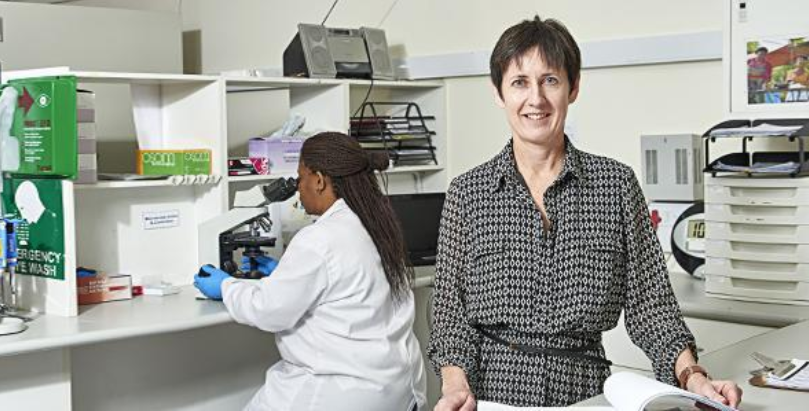
PHOTO: Wits University
Delany-Moretlwe was unpacking the latest HIV prevention technologies at the 11th SA AIDS conference held in Durban from 20-23 June this year. The World Health Organization, WHO, recommends that all people at substantial risk of HIV should be offered PrEP, following twelve successful trials among sero-discordant couples, heterosexual men, women, men who have sex with men, people who inject drugs and transgender women. The risk of drug resistance is low, occurring in about one in one thousand users in clinical trials – and exclusively among people who already had acute undetected HIV infection when they started PrEP.
Delany-Moretlwe added that there was no evidence for risk compensation, such as decreased condom use or more sexual partners. PrEP could be used with hormonal contraception and did not appear to alter its effectiveness. It could also be used during pregnancy, with trials showing no adverse events among women taking PrEP in early pregnancy. She added that the global uptake of PrEP had continued to increase despite the COVID-19 pandemic, with 2,2 million people worldwide now estimated to be using it.
Kenya and South Africa accounted for most PrEP initiations in Eastern and Southern Africa, on par with the USA.
Despite progress, there were still ‘enormous gaps’ in PrEP availability with only 28% of the target of three million people in LMIC countries using PrEP– just 8% of the new global 2025 target.
In Kenya and Uganda, universal access to PrEP was associated with lower HIV incidence (0.92 HIV incidence per one hundred person-years reduced to 0,32 overall.)
Delany-Moretlwe said the discontinuation of oral PrEP was associated with low perceived risk, side effects, pill burden and adherence challenges, other prevention methods, a lack of family support and cost.
Clinical trials to evaluate strategies to enhance PrEP showed no effect for drug-level feedback counselling using dried blood spots – which she speculated may be effective if used at point-of-care testing.
There was also no effect of in-person adherence clubs on oral PrEP continuation – although PrEP users valued supportive peer experience. There was a trend towards higher adherence in incentive-driven groups, but it was not sustained. There was no difference in SMS vs WhatsApp clubs for adherence support.
However, individuals exposed to decision support tools were twice as likely to persist with oral PrEP at one month.
Delany-Moretlwe said eighteen studies from thirteen countries, most conducted after 2018, showed that dosing regimen, type of product, side effects, cost, effectiveness, dispensing venue, and additional support services drove product preferences. Effectiveness and cost are frequently traded off each other.
Dosing frequency was an important driver of choices, and preferences varied by population.
The Dapivirine vaginal ring, (DVR, made of flexible silicone), was an increasingly popular product with self-insertion monthly and low systemic absorption. A big plus was that it did not interfere with sex. Two placebo-controlled trials of this ring showed that it reduced HIV risk by between 30% and 50% – and demonstrated safety in pregnancy and breastfeeding, with adherence higher than in previous studies.
The South African Health Regulatory Authority, SAHPRA, approved the DVR in 2022, with several implementation science projects planned and the potential for a three-month ring,
she added.
Another SAHPRA-approved product was the long-acting injectable Cabotegravir, which was safe and well tolerated, with effects sustained at one-year, post-unblinding.
Open-label studies were ‘ongoing.’
Delany-Moretlwe said that despite leading to increases in integrase-inhibitor drug resistance, cabotegravir-PrEP introduction was likely to reduce AIDS deaths in addition to HIV incidence.
“Long-acting cabotegravir PrEP is predicted to be cost-effective if delivered at a similar cost to oral PrEP with antibody-based rapid HIV testing,” she explained.
Cabotegravir could avert three times more HIV infections and save three times more life years, she stressed.
Looking ahead, she said Phase III trials of Lenacapavir, a potent novel antiretroviral that
supported six monthly dosing, were in progress, with results anticipated in
2025. Most exciting, however, was a dual prevention pill -against both pregnancy and HIV.
Acceptability studies for this were currently in progress among South African and Zimbabwean women aged 16 to 40 years old. Benefits to individuals and the health system would be huge, she said.
“We need a range of prevention options that can provide choice and increase HIV prevention coverage across the life course. Long-acting extended delivery products are being introduced to the health system and there are a range of topical and multi-purpose products in early-stage development,” she told her audience of over one thousand delegates.
Not all products would advance, and trials were ‘essential’ for identifying safety, effectiveness, and early implementation lessons. There were also lessons learned regarding the need for data on populations that had traditionally been excluded from trials.
“We need to anticipate success, understand user preferences and use differentiated service delivery models, plus address questions of access and cost early in drug development,” she concluded.’
*The sub-Saharan Africa region is amongst the world's highest initiators of oral PrEP (half to one million people by country), as
measured in May this year,